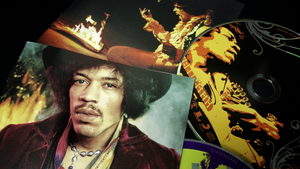A lawsuit filed by members of the Jimi Hendrix Experience against Sony Music is set to proceed to trial after the major’s latest attempt to get the case dismissed failed. The Court Of Appeal in London yesterday upheld a High Court ruling from last year that rejected Sony’s arguments for why the case should be dismissed.
The legal case is being pursued by the estates of Hendrix’s two bandmates, Noel Redding and Mitch Mitchell. Their lawyer, Lawrence Abramson of Keystone Law, welcomed yesterday’s appeals court ruling, stating, “we are not surprised by, but still happy with the result”, adding, “hopefully we can now obtain some justice for the families of Noel and Mitch”.
“No one is denying that Jimi Hendrix was one of the greatest guitarists of all time”, he continued, “just as Freddie Mercury was a great singer. But neither of them made their recordings alone. It has never been suggested that Brian May, John Deacon nor Roger Taylor should not have participated in Queen’s success so why should Noel and Mitch lose out from the success of the Jimi Hendrix Experience?”
The Redding and Mitchell estates - through UK-based companies - claim that they control rights in relation to the Jimi Hendrix Experience recordings catalogue.
These rights, they allege, are being infringed by the US company run by the Hendrix estate, Experience Hendrix, and its distribution partner Sony. The estates launched legal proceedings against Sony Music UK through the London courts in February 2022.
For their part, Experience Hendrix and Sony argue that, after Hendrix’s death in 1970, both Redding and Mitchell signed agreements giving up any claims to rights and royalties stemming from the Jimi Hendrix Experience in return for “significant monetary consideration”.
Shortly before the Redding and Mitchell estates went legal in the UK, Experience Hendrix and Sony filed legal papers with the New York courts seeking confirmation that those 1970s agreements are still in force.
Sony initially tried to get the estates’ UK litigation paused on jurisdiction grounds, arguing that the dispute centred on US contracts and should be considered by the New York courts first. When the London courts rejected that argument, the major then came up with various legal technicalities which, they said, were grounds for having the UK lawsuit dismissed.
The Redding and Mitchell estates have made claims in connection to both the copyrights in the Jimi Hendrix Experience recordings, and the two musicians’ performer rights in relation to those tracks. Sony’s arguments for dismissal were different for the copyrights and the performer rights, but both were rejected in the High Court last year. The Court Of Appeal also considered and rejected both arguments.
Under copyright law, performers have rights in relation to recordings on which they perform, even if they do not own the copyright. In practical terms that means labels need to get formal approval from performers to both record their performances and to subsequently commercially exploit their recordings.
Performer rights have evolved considerably since the Jimi Hendrix Experience recordings were made in the 1960s, a fact which was key to Sony’s arguments for dismissal. In particular, it argued that the expanded performer rights provided in the 1988 UK Copyright Act do not apply in this case because of agreements made in the 1960s and 1970s.
The appeals court’s judgement provides a summary of how performer rights have expanded, considers how the changes made to performer rights in 1988 apply to recordings that pre-date the act, and then concludes that Sony’s argument for dismissal of the performer rights claim at this stage are not valid.
As for the estates’ copyright claims, Sony argued that those were basically barred by the statute of limitations. However, the appeals court concurred with the high court that the relevant laws in this case do not stop the estates from making a claim for copyright infringement.
All of which means the dispute will now proceed to trial, set to arrive in court in December. Speaking for the estates, Edward Adams noted that, because of Sony’s “delaying tactics”, it will have taken four years to get the case properly to court. However, he added, “we retain our faith in the justice system that they and their licensors, Experience Hendrix, will be finally held fully to account”.

